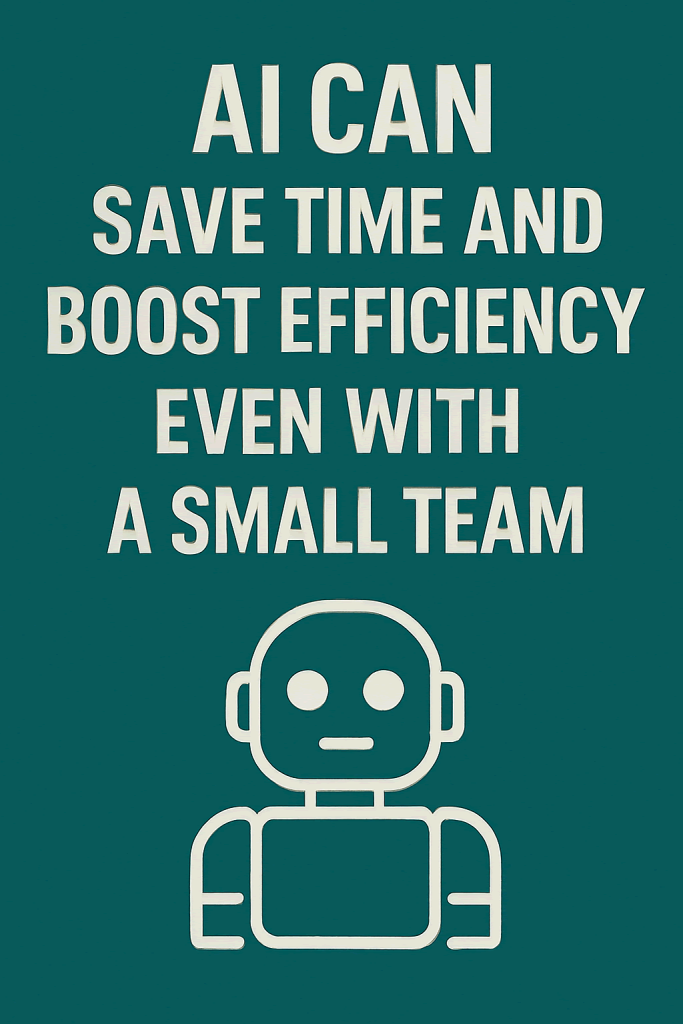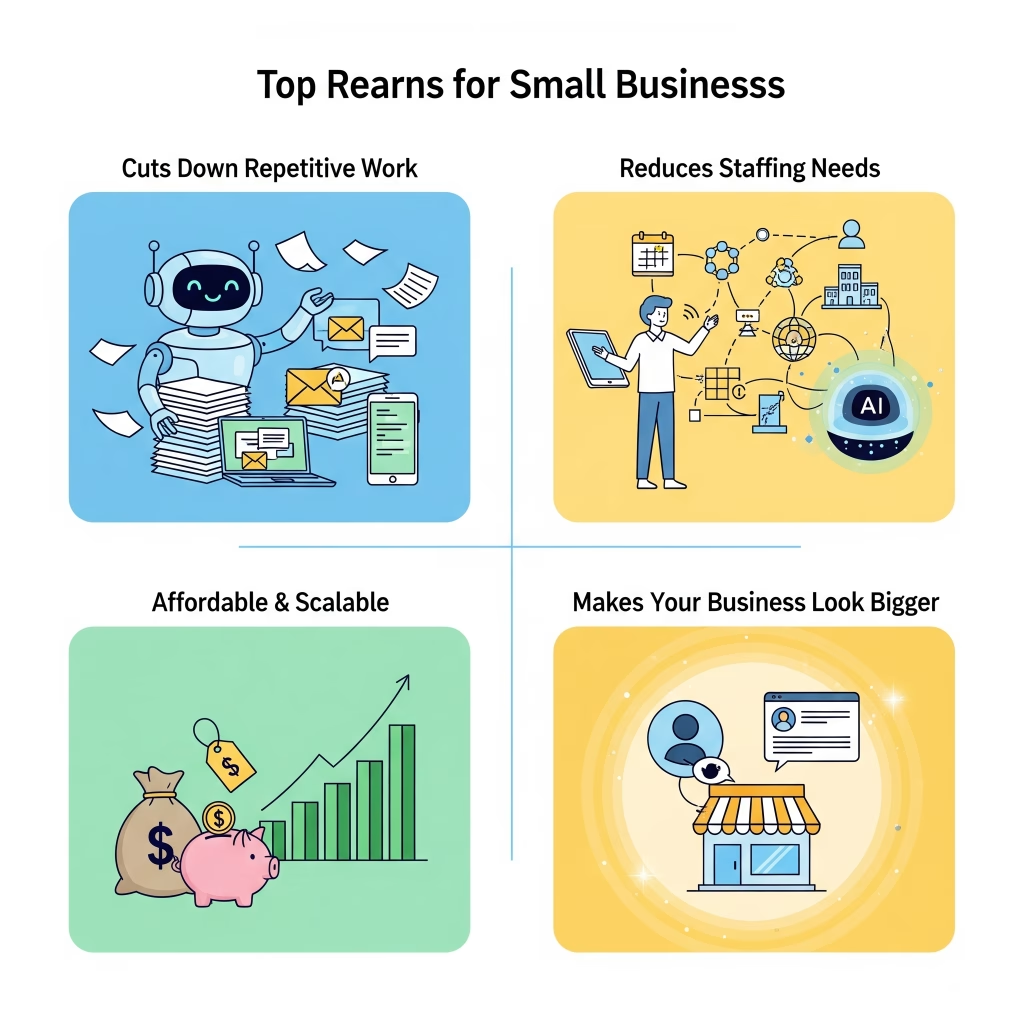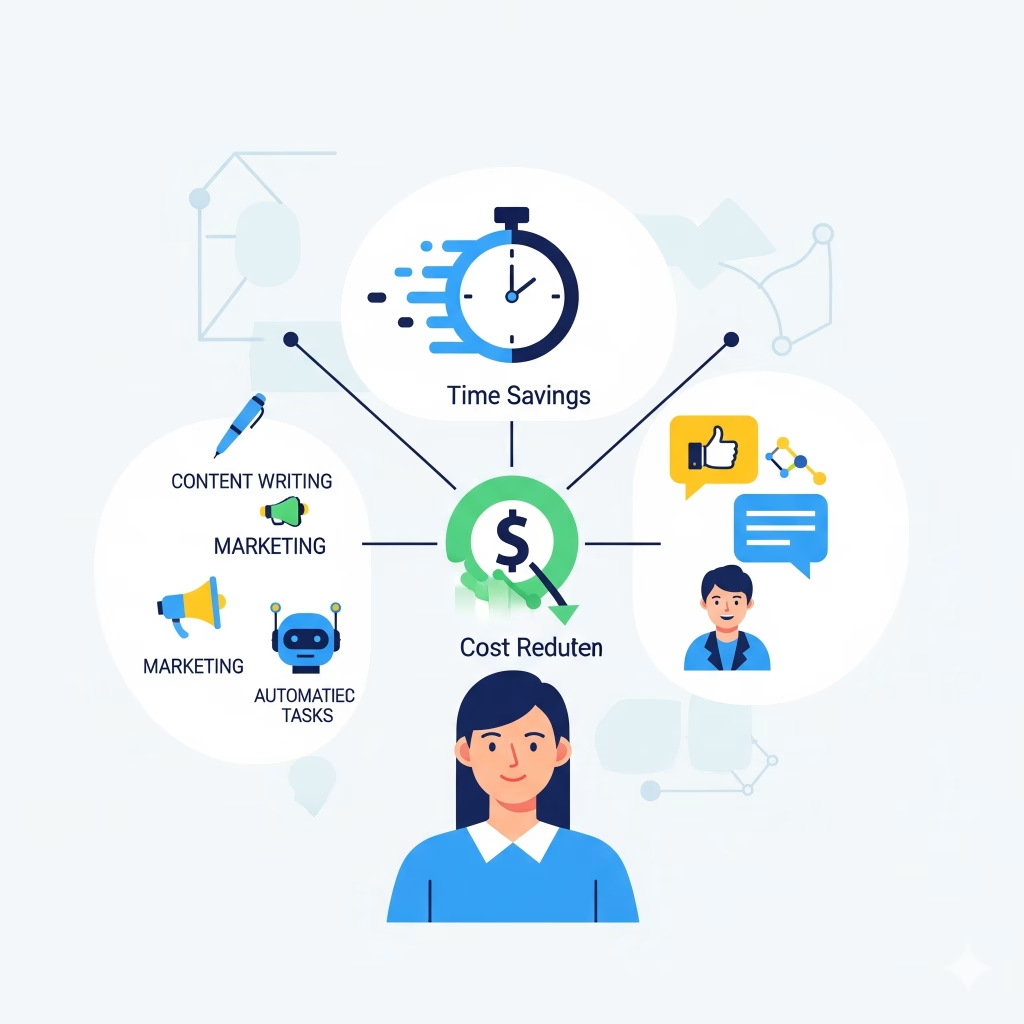AI is not only suitable for small businesses it’s a strategic advantage. It levels the playing field, giving smaller teams access to tools and capabilities that were once reserved for large enterprises. From generating high-quality content to automating repetitive tasks and analyzing customer behavior, AI enables small businesses to operate smarter, faster, and more efficiently.

One of the biggest benefits is time savings. AI can handle everything from writing product descriptions and blog posts to managing customer inquiries through chatbots tasks that would otherwise require hours of manual work. This frees up your team to focus on strategy, growth, and creative direction, rather than getting buried in routine operations.
🔧 Example for a Local Business (e.g., Photographer, Barber, Consultant)
- 💬 Chatbot answers hours, pricing, appointment booking
- ✍️ Website copy generated with AI Engine
- 📸 Image captions and service descriptions from GPT
- 📅 Booking confirmation emails written automatically
AI also helps cut costs without compromising quality. Instead of hiring large teams for marketing, support, or analytics, small businesses can deploy AI tools that deliver consistent, accurate results at a fraction of the cost. Whether it’s automating social media posts, improving SEO, or personalizing email campaigns, these tools offer measurable returns without draining your resources.

Most importantly, AI creates a more professional, responsive customer experience. It enables real-time interaction, smarter recommendations, and data-driven decisions all of which build trust and drive engagement. At Wemaxa.com, we help small businesses harness AI in practical, meaningful ways that enhance their brand, streamline their workflow, and support sustainable growth.
✅ Top Reasons AI Works for Small Businesses
1. Cuts Down Repetitive Work
- Auto-replies to emails and messages
- AI handles basic support and FAQs
- Writes website content, product blurbs, social posts

2. Reduces Staffing Needs
- Replaces the need for a full-time support rep
- Helps solo founders scale without burnout
- Offers 24/7 presence via chatbots and email assistants
3. Affordable & Scalable
- Use only what you need (free and pay-as-you-go models)
- No expensive contracts — most plugins cost under $20/month or one-time
- Easily integrates with tools you’re already using (WordPress, WooCommerce, Gmail, etc.)
4. Makes Your Business Look Bigger
- Smart, instant responses
- Personalized communication
- Consistent tone and branding with generated content
MORE LINKS:
AI bots installation
AI automation
ChatGPT integration
Content generation
AI user support
Best CMS for AI
AI newsletters
Content moderation
SEO optimization
AI INTEGRATION AND AI IMPLEMENTATION IN E-COMMERCE AND OTHER SMALL BUSINESSES
Is AI Suitable for Small Businesses?
The question of whether artificial intelligence solutions are a good fit for small businesses is no longer theoretical, it is one of the defining factors shaping competition across digital markets in 2026. In the past, AI was seen as a technology reserved only for corporations with vast budgets and dedicated R&D divisions, but today the democratization of AI tools has put powerful automation, predictive analytics, customer insights, and content generation into the hands of independent entrepreneurs and small teams. For small businesses operating in crowded markets, the opportunity lies not in replacing human decision-making but in augmenting it with machine learning that can identify hidden trends, automate repetitive workflows, and deliver a level of precision that would be impossible for a manual-only process. Consider for instance how a small e-commerce brand can deploy AI chatbots that integrate seamlessly with WooCommerce or Shopify, delivering around-the-clock support without the expense of hiring additional staff. At the same time, tools like Zapier combined with AI-powered assistants enable owners to orchestrate complex workflows that connect marketing, sales, and customer relationship management automatically.

🔹 Popular AI Use Cases for Small Business:
| Category | AI Feature Example | Tool/Platform |
|---|---|---|
| Customer Support | ChatGPT-style bot answers FAQs | WPBot AI, Tidio AI, AI Engine |
| Content Creation | Auto-generate blogs & service pages | GPT AI Power, Bertha.ai |
| Marketing | Email subjects, ad copy, product headlines | ChatGPT, Copy.ai, Jasper.ai |
| SEO | Write titles, meta tags, optimize content | RankMath AI, SurferSEO, Frase |
| Admin Tasks | Summarize form submissions or emails | Zapier + OpenAI, Notion AI |
Yet it would be misleading to claim that every AI application is universally beneficial without understanding the challenges small businesses face. Cost considerations, data privacy compliance, and integration complexity are very real issues, and decision makers need to evaluate whether the adoption of AI aligns with the maturity of their digital infrastructure. For example, a small accounting firm may find that implementing an AI-driven analytics platform such as Google BigQuery with embedded machine learning provides transformative insights, while another business that has not yet digitized its records might struggle to see the same return on investment. What is crucial is developing a roadmap that identifies clear use cases where AI adds measurable value. Marketing automation, customer support, predictive inventory management, and SEO optimization are consistently strong candidates. In fact, small businesses that utilize AI for local search visibility often outperform larger competitors who rely on slower, less adaptive methods. AI can analyze keyword intent, adjust content strategies dynamically, and help websites rank better on platforms such as Google Search while requiring minimal manual oversight.
The long-term viability of AI for small enterprises also depends on adopting a balanced approach that combines machine efficiency with human creativity. AI can generate large volumes of content, but human oversight ensures authenticity and brand voice remain intact. In customer service, AI can answer repetitive inquiries instantly, but complex or sensitive cases still require human empathy. In marketing, AI can crunch data to recommend optimal strategies, yet business owners must still make final calls based on vision and market knowledge. The small business advantage lies in agility. Where large corporations are slowed down by bureaucracy, a small enterprise can test, pivot, and refine AI implementations far faster. Companies like OpenAI, IBM Watson, and other leading AI providers have designed platforms that scale down as easily as they scale up, which means that even a two-person startup can access the same computational intelligence that global corporations use, provided they design their adoption strategy carefully.

At Wemaxa, our perspective is that AI is not only suitable for small businesses, it is rapidly becoming indispensable. With the rising costs of digital advertising and the increasing expectations of online customers, efficiency and personalization are no longer optional. AI makes it possible to tailor marketing campaigns to micro-audiences, optimize product recommendations in real-time, and automate repetitive administrative work so owners can focus on strategic growth. The businesses that hesitate may find themselves outpaced by competitors who deploy smarter, faster, and more efficient digital frameworks. The businesses that embrace AI thoughtfully, however, can punch above their weight, achieving levels of customer engagement and operational control that once required large dedicated teams. Whether you operate a local retail store, a boutique agency, or an online marketplace, AI is not a future consideration, it is a present-day lever for competitive survival and growth. In 2026 and beyond, the question is no longer “Is AI suitable for small businesses?” but rather “How quickly can you integrate AI before your competitors take the lead?”


